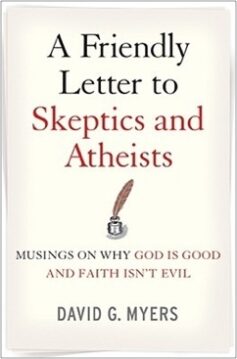A Friendly Letter to Skeptics and Atheists: Musings on Why God is Good and Faith Isn’t Evil

Responding to the “new atheist” assertion that religion—all religions—are “dangerous” (as well as false), David bridges the skeptic/believer dichotomy and suggests how faith can be reasonable, science-affirming, healthy, hopeful, and humane.
Social psychologist Myers adds to the numerous apologetic texts that have emerged since the neoatheist movement began. But this quick jaunt into potentially dangerous waters is head and shoulders above the rest.
—Publishers Weekly
Witty, disarming, engaging, informative, and above all, great fun to read. The best response to the 'New Atheism' to date.
—Alister McGrath, Oxford University theologian-biophysicist
In the middle of one of the most heated debates between theists and atheists in history, David Myers has penned this honest and engaging look into the soul of religion and belief in God. He is the perfect person to write this book because he is both a skeptic and a theist, a world class debunker of all things nonsense, and yet a man of faith. How can these two traditions be reconciled? Read this book to find out.
—Michael Shermer, Publisher of Skeptic magazine, monthly columnist for Scientific American, author of Why Darwin Matters, How We Believe, and The Science of Good and Evil
With winsome humor and refreshing humility, David Myers offers a compelling case for skeptics and secularists that mature believers are a lot more like them than they realize—committed to reason and evidence, and offended by misuses of religion by dogmatists with personal or political agendas. Yet he also shows how life can be enriched by embracing a spiritual worldview that adds to rather than subtracts from the search for truth. This is the perfect book for your friend who is an open-minded atheist or agnostic.
—Francis S. Collins, M.D., Ph.D., Director of the Human Genome Project and author, The Language of God
We atheists and skeptics, who pride ourselves on our open-mindedness, desperately needed someone to speak up for religion in a language we could understand. With humility, erudition, and a profound commitment to scientific truth, Myers has given us the book we must all read before we jump to conclusions about the nature and value of religion.
—Jonathan Haidt, University of Virginia psychologist and author of The Happiness Hypothesis: Finding Modern Truth in Ancient Wisdom
Is religion evil? Psychologist Dave Myers concedes that evil acts have been done in the name of religion, but he challenges skeptics who condemn all religion to do their homework more carefully. At the same time he challenges his fellow believers to confront the looking glass to see where some of the critiques may have more than a grain of truth. I highly recommend this non-polemical treatment for thoughtful readers of all persuasions.
—Owen Gingerich, Professor of Astronomy & History of Science Emeritus, Harvard-Smithsonian Center for Astrophysics, and author, God’s Universe
Engaging, thought-provoking, inspiring … and, most importantly, timely and extremely valuable. It provides a great model of sensible Christianity.
—Andrew Elliot, University of Rochester psychologist
ReadtheSpirit.com interview with David.
Newsweek/Washington Post religion blog essay by David: Believers can be reasonable. (2008, September 16). onfaith.
Sightings (University of Chicago Martin Marty Center) essay by David: Religion is ridiculous? (2008, October 23).
Chronicle of Higher Education essay/letter (PDF) by David.
Perspectives article (PDF) by David: National secularity, individual religiosity, and human flourishing. (2008).
Cardus essay by David: Redeeming psychology means taking psychological science seriously. (2009, June 1).
Table of Contents
(NOTE: All links in this table of contents will download PDFs)
-
Preface
I aim to suggest to skeptical friends how someone might share their commitment to reason, evidence, and, yes, even skepticism, while also embracing a faith that makes sense of the universe, gives meaning to life, connects us in supportive communities, mandates altruism, and offers hope in the face of adversity and death … [more]
-
False and Dangerous
Mindful of the God-professing but war-making American president, the faith-inspired atrocity of 9/11, the gay-bashing (and sometimes gay) ministers and politicians, the religious opposition to medical stem cell research, and the science-denigrating creationists, many of you, my secular friends, understandably have had it with religion. In today’s world, believing in God strikes you as an irrational delusion and a social toxin … [more]
-
My Assumptions
Framed positively, the new atheist books are not just an attack on mindless, unbending religion, but an affirmation of reason, evidence, and critical intelligence. Therein lies our common ground. We agree: Let’s, with a spirit of humility, put testable ideas to the test and then let’s throw out religion’s dirty bathwater. And we differ: Is there amid the bathwater a respect-worthy baby—a reasonable and beneficial faith? … [more]
- Mea Culpa
- The Dance of Fanatics and Infidels
- Simplistic Stereotypes
- The Heart of Science and Religion
- The Skeptics' Boys Club
- Inseparable Body and Soul
- Does Prayer “Work”?
- The Benevolent Fine-Tuned Universe
- Big Ideas and Biblical Wisdom
- Secularism and Civility
- God and Gays
- (Nominal) Religion Feeds Prejudice
- Godliness and Goodliness
- Happy Faith-Heads
- Healthy Faith-Heads
- Does Explaining Religion Explain it Away?
- The Leap of Faith
- Appendix: International Society for Science and Religion Statement on Intelligent Design.
Order the book from amazon.com